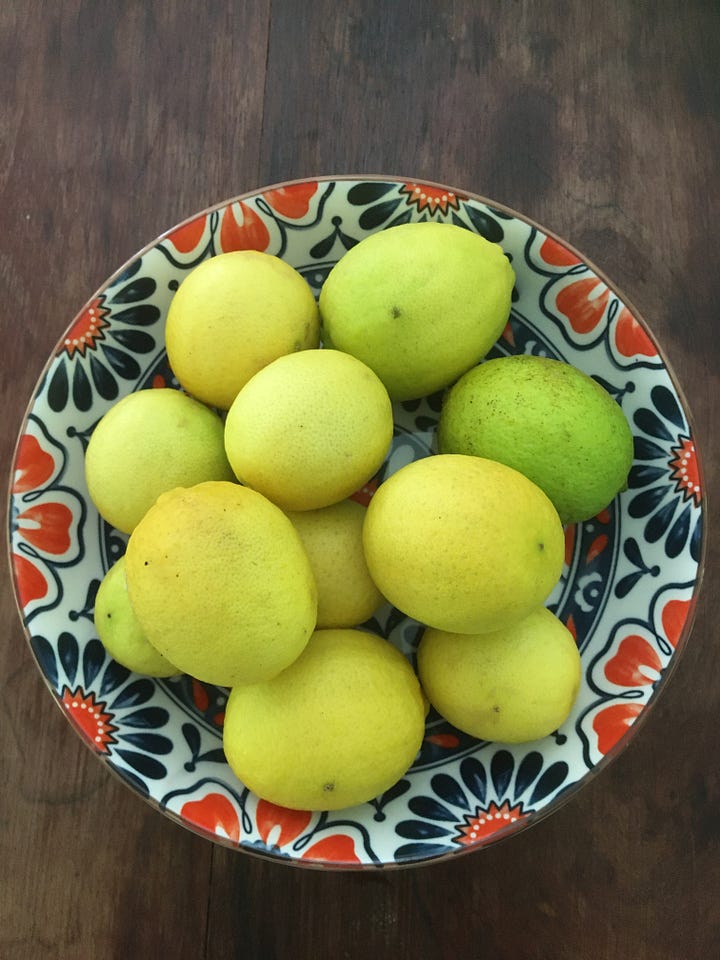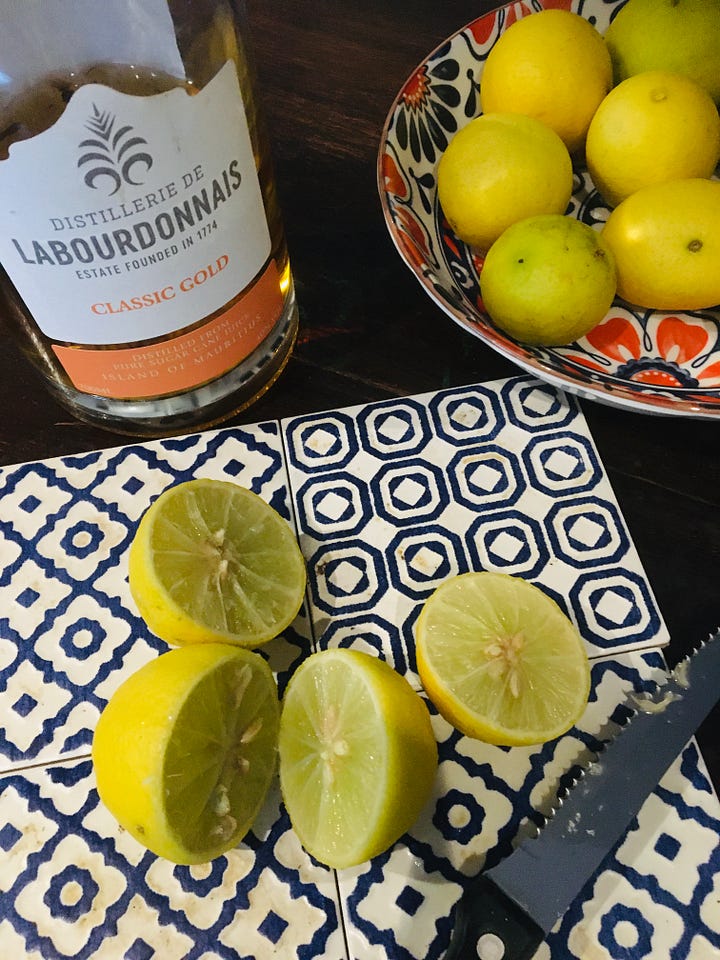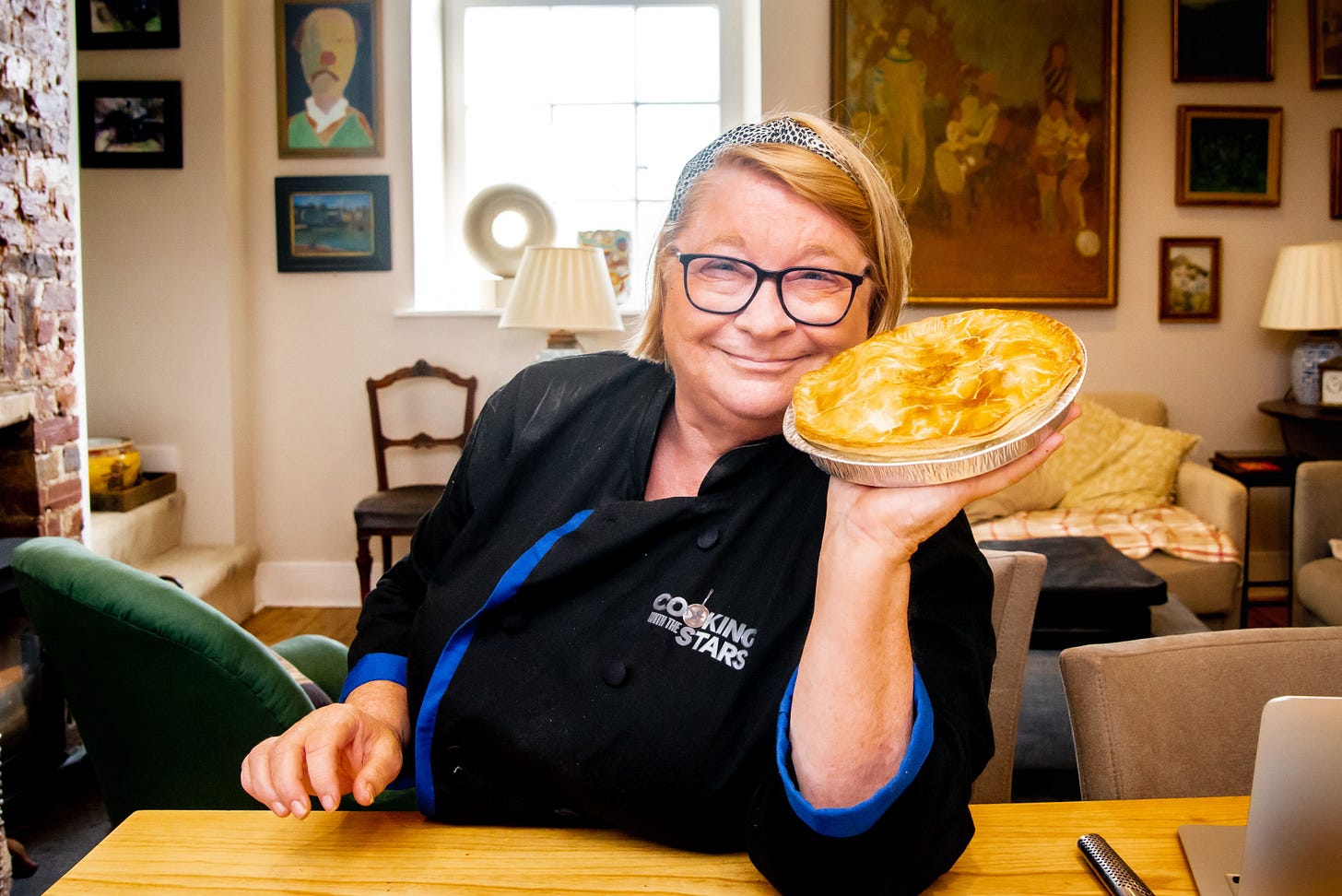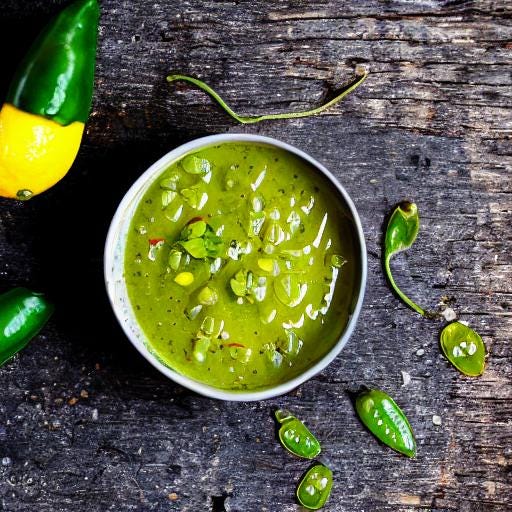Mauritius, fairy tales and absinthe
Follow The Lemon Grove on Instagram: @lemongrovepics and Facebook /lemongrovesocial
Hello and welcome to the latest edition of The Lemon Grove. We kick off with an events listing, then look at the Indian island of Mauritius, its lemons followed by a couple of recipes for a mouth-puckering rum punch, and lemon and chilli paste. This week, we’re ending with a quick look as lemony and orangery fairy tales … who knew!
Bruce and The Lemon Grove's Spring events diary
Hosting the Cooking Demonstration Stage at:
Tonbridge Farmers’ Market (every second Sunday of the month, 9.30am - 1.30pm)
Aylesford Farmers’ Market (every third Sunday of the month, 9.30am- 1.30pm)
I'll be sharing recipe ideas using food from the farmers market and interviewing many great local growers and producers making wine, bread, jams, marmalade, and much more. Follow Tonbridge Farmers’ Market for updates.
SPECIAL EVENT: Celebrity chef Rosemary Shrager
Tonbridge Farmers’ Market
Saturday May 14, (9.30am - 1.30pm)Celebrity TV chef and now author of culinary mystery thrillers, Rosemary will at the market with her new ‘Prudence Bulstrode’ murder mystery, The Proof in the Pudding. She’ll be selling books and signing any of her cookbooks that you bring along. I’ll be hosting the cooking stage and interviewing Rosemary, live!
Check my Instagram @lemongrovepics for updates.SPECIAL EVENT: Tunbridge Wells Literary Festival
Monday, 22 May. 10am - 1pmCreative Writing - Short Stories
Murder, Romance, Farce …Express yourself through a piece of Flash Fiction, (short story of 500 words maximum) through understanding the structures and techniques that will keep your readers engaged. A fun, interactive class …
Book your place HERE.SPECIAL EVENT : Creative Writing - Inspired by Art
Two weeks, Thursdays, starts July 13. 10.30am - 12.30pm
During this two day course we will use thre
e pieces and styles of art to inspire your creative writing. We’ll take three works of art by internationally important artists, sculptures and creators to inspire story writing including fiction and poetry. These paintings and sculptures will fire the imagination as you take inspiration from the artists’ life and work, and use these thoughts and observations to craft your own personal impressions for your own pleasure or to share with friends and family.
Book your place HERE.
Your citrus pictures and stories
Citrus is a crucial ingredient in many dishes in many countries and can be found in most recipe books. Fruits such as lemon, lime and oranges are often referred to as adding acidity to food, adding lightness and freshness and, generally, making things taste better. Adding lemon changes the profile of savoury and sweet dishes, a flavour enhancer cutting through fatty foods giving them a fresh, bright and clean taste, while 'cooking' meats such as ceviche from Peru. Lemon juice and zest play with notes of bitterness, sweetness and piquancy.
Thank you to everyone who sends me photos of lemons from Mauritius, California, Italy, France, Turkey, Cornwall and many other lovely places. They are all very much appreciated!
The harvest was not without its casualties


Harvesting lemons is a rewarding but sometimes challenging job. The headline of this story is a quote from a friend of mine from her new home on the island of Mauritius.
The mere mention of Mauritius may well bring images of golfers, sandy beaches and waving palm trees, offering a clichéd vision of Mauritius, a remote island in the Indian Ocean. So, while those images are authentic, this place has layers of complexity and messy history settled by travellers driven initially by European colonial powers and enslaved labour bought in to work sugarcane plantations. Labour from India and China was also shipped in to work the land. Another significant group on the island are Mauritian Creoles, known for their African heritage with varying amounts of French and Indian ancestry.
A more recent arrival is a friend and colleague from my business newspaper days who recently moved to the island with her husband and three children from Shropshire, England. Both parents are authors and can work digitally. At the same time, their children experience an outdoor life hiking in the tropical hills under a lush green canopy or kayaking on crystalline, turquoise seas.
Knowing of my love of all things lemon and citrus, this friend has sent me images of pippy lemons that grow on a solitary citrus tree in her garden. Mango and guava trees dominate her slice of paradise, allowing her children to push culinary inventiveness with ice creams, sorbets, cakes and juices.
I'm not sure which variety of lemon this is but suspect it might be a Rodrigues lemon, named for another Indian Ocean island. Rodrigues is a tiny island between Mauritius and the much larger Madagascar to the west.
The Rodriguan lemon has a distinctive, acidic flavour and is considered a distant cousin of the Mexican or Key lime. It's a cash crop from the island of Rodrigues and a garden crop on Mauritius itself.
Should you be lucky to feel the warm beach sands of Mauritius squeezing between your toes this July (7th – 17th), head for Heritage Resorts and join their Sustainable Culinary Week, created to raise awareness and action for sustainable production and support local food producers.
RUM & Ti' PUNCH, a recipe from a tropical isle
With so many hectares of sugarcane under production it's no wonder that rum and rum cocktails feature in ex-pat parties, creole kitchens and on the wish list of horny honeymooners staying in 5* luxury resorts!
Family-owned distillery Rhumerie de Chamarel lies in the southwest reaches of the island, making a range of rums, including white, spiced, and flavoured. A limited-run rum is double-distilled before aging in three different French oak barrels. Cask-finished rums are aged for up to eight years.
Along with raw sugar, rum is one of the island's most important foreign currency earners. The island's sugar has caramel notes, some spiced with vanilla and cinnamon. Moonshine rum or rhum arrangé is made by putting lemongrass, ginger, vanilla pods or cinnamon bark into bottles of locally produced rum. These are left to age for several months.
My friend uses her lemons to make Ti' Punch (a small punch in Mauritian creole); She says it's basically lemons, rum and a bit of sugar, all grown and produced locally.
Serve this drink in an Old-fashioned glass, garnished with a lime disc. Perhaps zest a bit of lime or lemon on the finished drink.
60ml (2 ounces) White rum (rhum agricola if possible)
1 tsp Sugar syrup (perhaps Giffard Sugar Cane Syrup)
1 lime wheel (fresh)
Ice, a small chunk of block ice (very optional, mostly served without).
To make a single drink (multiply numbers to more for friends), pour rum and sugar syrup into a glass (or shaker). Then, squeeze the lime disc into the liquid, followed by the fruit. Gently stir. No need to shake or stir.
If you find a bottle of rhum agricole, rum made using fresh sugarcane juice in place to the more common molasses, then grab it. It offers a more nuanced flavour characterised by grassy, earthy aromas. The sugar syrup adds flavour and smoothing any rough edges from the drink.
This is also popular across other French-heritage islands in the Indian Ocean and Caribbean, such as Martinique, Haiti and Réunion. It's often drunk without ice but chased with a glass of chilled water, known as a 'crase' in Martinique.
Mauritian Lemon & Chilli Paste
Green chillies, 120 gm
Garlic, 2 cloves
Around ¼ cup vegetable oil (more or less depending on how much it needs to blend the paste finely)
Salt, to taste
Lemon, half
Olive oil (only if necessary)
Put the lemon aside and add all the others to a blender.
Squeeze lemon juice into the blender.
Thinly slice the lemon and add to the mix.
Blend to a smooth paste, adding a few drops of oil to loosen the paste, if necessary).
How to use: Mix some, to your taste, with yoghurt, sour cream or mayonnaise for a quick chilled sauce. Use as a marinade or finishing paste on BBQ veg and meats, and add it to stews, soups and or a stir fry.
Keeps: in the fridge for about a week. Freezes well.
Fairy tales with a squeeze of lemon and orange
Once upon a time, I sat in on a couple of Creative Writing classes to pick up ideas and observe different ways of teaching adults. In one class, the teacher mentioned fairy tales and how writing about imaginary beings in a magical realm can be an enchanting experience for both the writer and reader.
These short stories are often disguised as morality tales and mostly have a happy ending. It’s often where the character triumphs over adversity while winning the hand of an enchanted princess or handsome prince or rises through adversity, such as in The Ugly Duckling or Hansel and Gretel. Many are hundreds of years old, handed through the generations as folklore.
I shall use fairy tales next week in my next Creative Writing class for Kent Adult Education, encouraging my students to explore the dark side of their imaginations, how to include a transformation in the story, and how to finish on a happy note.
And, of course, I may talk about oranges and lemons in fairy tales. The Love for Three Oranges (The Three Citrons) is an Italian literary fairy tale involving a prince, a cut finger, dripping blood, a block of cheese and a bad before rescuing his bride from an imposter. Another is The Lemon Tree by American writer Ben Loory, who creates fantastical tales in a documentary style and tells of a lemon tree that changes into an apple tree, with fruit tasting of citrus.
Have you ever tried Absinthe, the highly alcoholic drink said to have sent artist van Gogh off the rails. Traditionally green in colour, Absinthe is often referred to as 'La Fée Verte', the Green Fairy. It's made with a holy trinity of botanicals - wormwood, anise, and fennel. The name is derived from the Latin name for wormwood, Artemisia Absinthium. The drink has a thrilling history from its first appearance in ancient Egyptian and Syrian writings to Swiss apothecaries of the late 1700s, and from malarial cures in the French army of the mid-1800s to getting banned for its high alcohol content in the early 1900s. Today, it's back in fashion and a delicious addition to your cocktail cabinet, assuming you have a taste for aniseed.
Now, the only question remains … will the prince have to slay the dragon to win the hand of the fair maiden?
Bruce McMichael
Writer, Podcaster, Educator
Website: www.thelemongrove.net
Twitter: @lemonbites
Facebook: @lemongrovesocial
Instagram: @lemongrovepics
Disclosure: I am an affiliate of Bookshop.org









Lovely post!